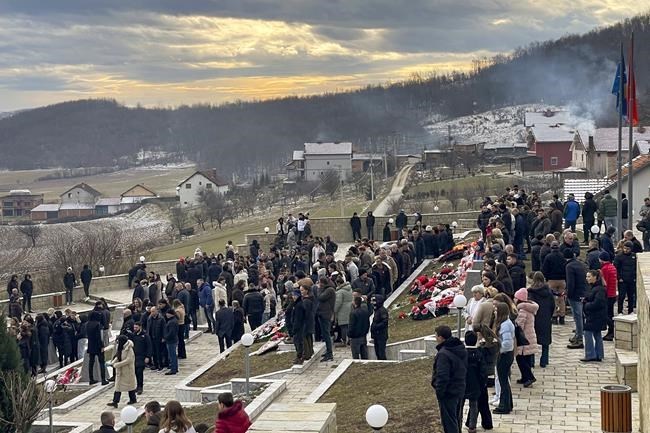
People walk in a cemetery during a memorial event for Kosovars killed in 1999 by Serb forces in Recak, Kosovo, Monday, Jan. 15, 2024. Hundreds of Kosovars have gathered in a southern village to commemorate the 25th anniversary of the mass killing of 45 ethnic Albanians by Serb forces which was a decisive moment to spark international anger and prompt a 78-day U.S. and NATO air campaign to end Kosovo's 1998-99 war.(AP Photo/Zenel Zhinipotoku)
Republished January 15, 2024 - 6:56 AM
Original Publication Date January 15, 2024 - 4:11 AM
RECAK, Kosovo (AP) — Hundreds of Kosovars gathered in a southern village on Monday to commemorate the 25th anniversary of a mass killing of 45 ethnic Albanians by Serb forces, an event that helped spark international intervention to end a 1998-99 war in Kosovo.
Kosovo President Vjosa Osmani, Prime Minister Albin Kurti and Parliament Speaker Glauk Konjufca joined citizens at a cemetery in Recak, 32 kilometers (20 miles) south of the capital, Pristina, for the commemoration ceremony.
Former U.S. diplomat William Walker, 88, who led an Organization for Security and Cooperation in Europe mission tasked with overseeing a cease-fire agreement, also was present. Walker's use of the term “massacre” to describe the killings in Recak paved the way for a 78-day NATO bombing campaign of Serb forces that ultimately ended the war. He is revered as a hero in Kosovo.
The government of Serbia’s then-president, Slobodan Milosevic, claimed that the dead were members of the rebel Kosovo Liberation Army who were killed in combat with state security forces.
“This was one of the most horrendous massacres committed by the Milosevic regime at that time, showcasing once again that their intention was to commit crimes against humanity and genocide against the people of Kosovo,” Osmani said.
At the time of the war, Kosovo was a province of Serbia. A Serb government crackdown on Kosovo’s separatist ethnic Albanians killed some 13,000 people, most of them ethnic Albanians. The United Nations governed the province until 2008, when Kosovo declared independence, an act that the government in Belgrade still hasn’t recognized.
Kurti denounced Serbian President Aleksandar Vucic for not recognizing and apologizing for the Recak massacre, either as Milosevic’s minister of information or Serbia's current leader.
The mass killings in Recak were the first confirmed through evidence collected by international monitors and made known to the world through international news coverage, Kurti said.
"The Recak massacre has been proved as a crime against humanity in front of the world and of history,” the prime minister said.
U.S. Ambassador to Pristina Jeffrey Hovenier affirmed Washington’s stance on the massacre, repeating what then-President Bill Clinton said, that “This was a deliberate and indiscriminate act of murder designed to sow fear among the people of Kosovo.”
“Peace and justice come from a clear-eyed acknowledgement of past crimes. This is vital to ensure these heinous crimes never happen again. But recognizing the truth of the past is just the first step towards justice,” he said at a ceremony in Recak.
The European Union office in Pristina was also part of the commemoration, saying that, “Justice for this heinous crime must be served and perpetrators held accountable.”
Relations between the two neighboring countries remain tense and flare from time to time. In September, a gunbattle between about 30 Serb men and police in northern Kosovo left an officer and three gunmen dead.
European Union-facilitated talks on normalizing Kosovo-Serbia ties are at a stalemate.
___
Associated Press writer Llazar Semini in Tirana, Albania, contributed to this report.
___
Follow Llazar Semini at https://x.com/lsemini
News from © The Associated Press, 2024